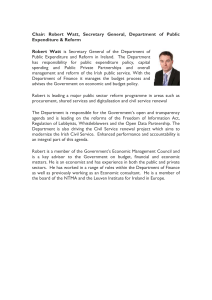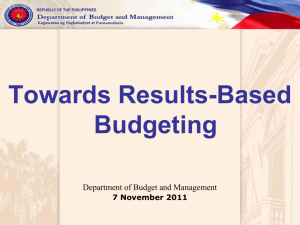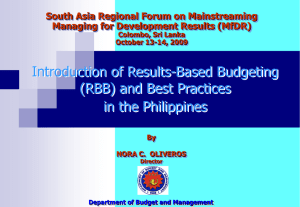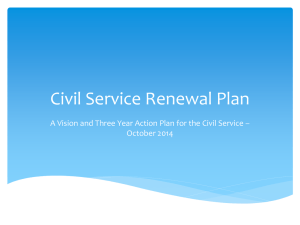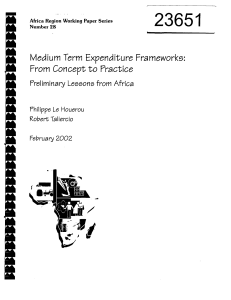Dr. Llanto
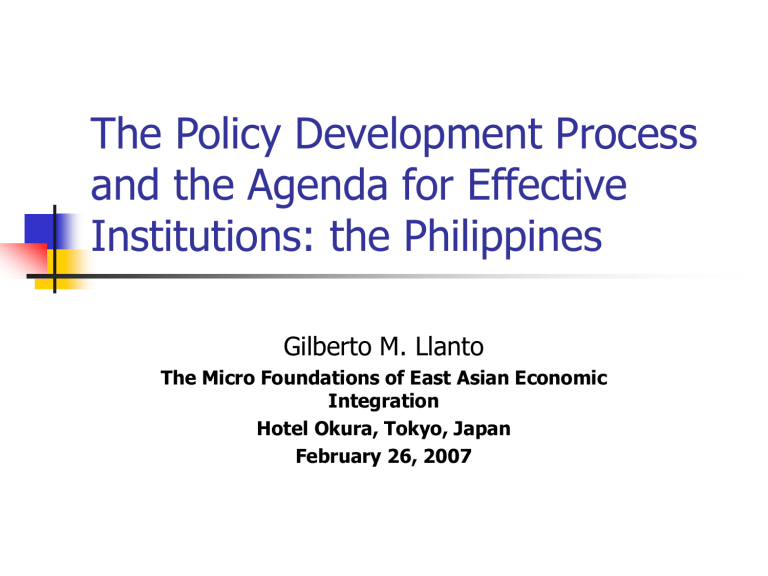
The Policy Development Process and the Agenda for Effective
Institutions: the Philippines
Gilberto M. Llanto
The Micro Foundations of East Asian Economic
Integration
Hotel Okura, Tokyo, Japan
February 26, 2007
Institutions and the policy development process
Implementing institutions
Supporting institutions: (a) coordinating body and (b) independent policy review institution
G M LLANTO- The Policy
Development Process and the
Agenda for Effective Institutions 2
The paper discusses role of supporting institutions in the policy development process and offers suggestions on how to make them more effective.
G M LLANTO- The Policy
Development Process and the
Agenda for Effective Institutions 3
Current economic situation
Modest economic performance (GDP growth Q1 to Q3 at 5.4%; fiscal deficit,
2.7% of GDP in 2005; expected to decline to 0.9% in 2007.
Low level of productivity
Huge public debt
BUT growth potential is considerable
G M LLANTO- The Policy
Development Process and the
Agenda for Effective Institutions 4
What to do?
Need to accelerate economic policy reform efforts
As economies evolve, so should structures and institutions
Economic reform has to be continuous.
G M LLANTO- The Policy
Development Process and the
Agenda for Effective Institutions 5
Supporting institutions
Coordinating institutions: National
Economic and Development Authority
(NEDA) and the Department of Budget and Management (DBM)
Independent policy review institution:
Philippine Institute for Development
Studies
G M LLANTO- The Policy
Development Process and the
Agenda for Effective Institutions 6
Recent reform effort by DBM
Public expenditure management reform: (a) medium term expenditure framework (MTEF), (b) organizational performance indicator framework
(OPIF), and (c) accountability, monitoring and evaluation framework.
G M LLANTO- The Policy
Development Process and the
Agenda for Effective Institutions 7
OPIF
Outcomes and outputs framework: (a) support policy development process, (b) strengthen departments’ internal management and (c) strengthen external reporting for accountability purposes
G M LLANTO- The Policy
Development Process and the
Agenda for Effective Institutions 8
Logical frameworks done for 20 departments
OPIF document to accompany the budget documents to be submitted to
Congress (national expenditure program,
President’s budget message)
G M LLANTO- The Policy
Development Process and the
Agenda for Effective Institutions 9
Main challenge to OPIF, MTEF
Congress acceptance of three year
MTEF framework and OPIF which fosters accountability
Convincing congress that good economics is good politics; coordinating bodies (DBM, NEDA) need to improve technical and political skills
G M LLANTO- The Policy
Development Process and the
Agenda for Effective Institutions 10
Independent policy review institution
Philippine Institute for Development
Studies has statutory independence and capable research staff, but it is financially weak and dependent on government subsidy for operations.
G M LLANTO- The Policy
Development Process and the
Agenda for Effective Institutions 11
Need to improve capacity of policy review institution
Australian experience shows benefits of good evaluation: (a) pinpoints accountability, (b) reduces cost, and (c) leads to good policy choices.
G M LLANTO- The Policy
Development Process and the
Agenda for Effective Institutions 12
Concluding remarks
The policy development process needs supporting institutions: (coordination tasks as well as independent review)
Policy development process is not a disembodied phenomenon.
The message (content) of the reform is important but the medium (effective institutions, both implementing and supporting) is also critical.
G M LLANTO- The Policy
Development Process and the
Agenda for Effective Institutions 13
Thank you!
G M LLANTO- The Policy
Development Process and the
Agenda for Effective Institutions 14
